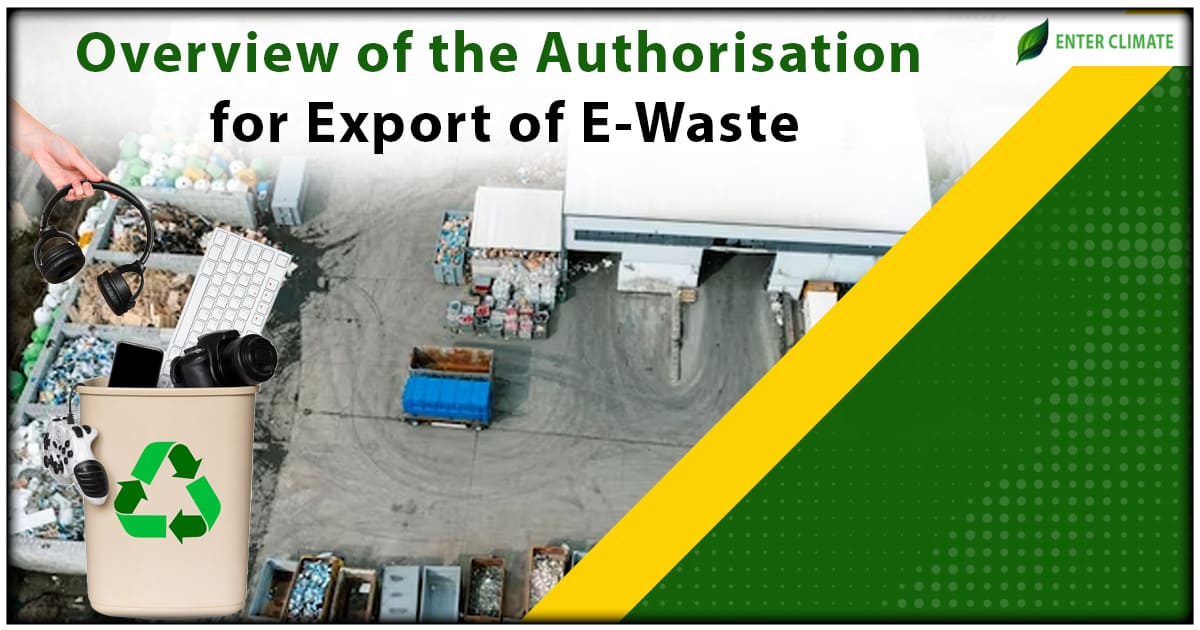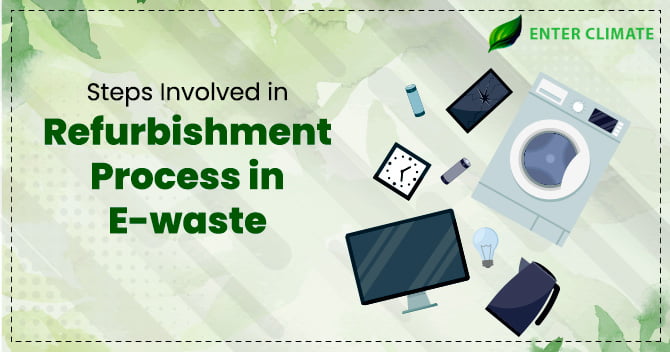Overview of the Authorisation for Export of E-Waste
 25 Jul, 2023
25 Jul, 2023 
The generation of electronic waste (e-waste) has significantly increased globally due to growing electrical and electronic equipment (EEE) consumption and increased product obsolesce rate. Various electronic devices and appliances, such as old phones, TVs, laptops, desktops, refrigerators, and power backup systems, retain considerable value even when abandoned. In India, e-waste[1] processors possess a substantial stockpile of valuable scrap containing precious metals like gold and silver. However, they find themselves in a difficult situation. To extract these precious metals from the scrap, they must comply with strict national regulations, leading to the necessity of obtaining authorisation for the export of e-waste. This article will give you an overview of the process of authorisation for export of e-waste and the advantages associated with e-waste export.
Regulation in Authorisation for Export of E-waste
The transboundary movement of e-waste is governed by the Hazardous Wastes (Management) Rules, 2022.The enforcement of e-waste management in India involves various agencies, including:
- Ministry of Environment & Forests, GoI
- Central Pollution Control Board (CPCB)
- State Pollution Control Boards (SPCB)
- Directorate General of Foreign Trade
- Port Authorities and Customs Authorities under the Customs Act, 1962.
Popular E-waste items being exported from India
The following e-waste items are popular in the list of exported items:
- Non-dispersible metallic waste made of metal and metal alloys.
- Metal waste, including alloys containing tellurium, antimony, cadmium, and lead.
- Waste containing compounds of antimony, cadmium, lead, tellurium, and other substances.
- Waste containing metal carbonyls.
- Waste from galvanic processes.
- Waste alcoholic beverages used for metal-pickling.
- Zinc processing waste, dust, and sludges, such as hematite and jarosite, require leaching.
- Discarded zinc waste.
- Electrical and electronic scrap or assemblies.
- Waste primarily comprises inorganic components but may also contain metals and organic compounds.
- Bulk clean metal scrap, including alloys (sheet, plates, beams, rods, etc.), fragments of beryllium, cadmium, lead, tellurium, and selenium, excluding lead-acid batteries.
- Dispersible metallic waste of molybdenum, tungsten, titanium, niobium, tantalum, and rhenium, including metal powder.
- Heavy non-ferrous scrap mixed with cadmium, antimony, lead, and tellurium.
- Solid residues of precious metals may contain traces of inorganic cyanides.
- Non-dispersible by-products of mining.
- Glass waste that is not recyclable.
- Fluoride-calcium sludge.
- Outdated multipurpose printing and copying equipment.
Eligibility for Authorisation for Export of E-waste
To obtain permission or a license from the Ministry of Environment and Forests (MoEF) following Schedule I, the following entities are required:
- Producer of E-waste
- Dismantler of E-waste
- Refurbisher of W-Waste
- Manufacturer of E-waste
- Mass Quantity Consumer of Electronic Devices
- E-waste Collection Organizations
Procedure of Authorisation for Export of E-waste
Applicants are required to submit their applications to the Ministry of Environment and Forest.The applicant must provide evidence of their physical presence in India to be eligible for e-waste export permission. In addition, the individual intending to export must obtain a No Objection Certificate from both the MoEF and the State Pollution Control Board (SPCB).
The importing country must also provide written authorisation in advance for India to export the waste. For example, a recycler or dismantler must obtain Australia’s prior informed approval before exporting waste to that country.
The Authorisation for Export of E-waste, granted by the Ministry of Environment and Forest, will be coordinated with the concerned State Pollution Control Board (SPCB), the Pollution Control Board of the State where the exporting port is located, and the relevant Port and Customs authorities. This is done to ensure compliance with the conditions of the export permission.
The exporter must ensure that no shipment is dispatched before receiving the importing country’s prior informed approval. Additionally, the exporter must include a movement document in Form 6 along with the shipment. The e-waste exporter is responsible for maintaining records and tracking the movement of the waste.
Documents required for Authorisation for Export of E-waste
To obtain authorisation for export of E-waste, the following documents are required:
- Completed Form 5
- Explanation or justification for the export
- Valid Operation Permission as per the Water Act of 1974 and the Air Act of 1981
- Valid authorisation in accordance with the 2016 E-waste (Management) Rules
- Insurance coverage for environmental and health risks during transportation
- Consent Letter from the State Pollution Control Board (SPCB)
- Copy of the contract between the importer, exporter, and buyer
- Permission Certificate or License from the Ministry of Environment and Forest (MoEF) for e-waste export
- No Objection Certificate (NOC) from the MoEF
Validity of Authorisation for Export of E-waste
The validity of the No Objection Certificate (NOC) issued by the Ministry of Environment and Forests (MoEF) remains in effect until the expiration of the Consent Letter issued by the relevant State Pollution Control Board (SPCB) of the respective state. The duration of the Consent Letter may vary from state to state.
Conditions when E-Waste cannot be exported
The export of e-waste from India will be considered unlawful under the following circumstances:
- When it is conducted without the permission of the Central Government as stipulated under the HWM Rules and other regulations.
- When permission has been obtained through falsification, misrepresentation, or fraudulent means.
- When the waste being transferred does not comply with the shipping details specified in the movement documents.
- When it involves the intentional disposal (dumping) of hazardous waste, contravening the Basel Convention and violating general principles of international or domestic laws.
Conclusion
Transboundary movement of hazardous waste is governed by the principles of the Basel Convention, to which India is a signatory. The export of e-waste is sought by some developed countries because it is far more expensive to recycle their own e-waste at home than simply exporting it at cheap rates to developing countries. This is mainly due to the strict regulations and costly waste management processes in such countries. However, some developing India exports most of the waste because of the lack of the infrastructure for precious metal recovery. Amidst all theseregulations, it may become difficult to take all required permissions for Exports. The assistance of licencing experts can, however, make the process of Authorisation for export of e-waste swift and hassle-free.
FAQs
For every producer or importer engaged in the production of electric or electrical equipment, obtaining an Extended Producer’s Responsibility (EPR) certificate or license is essential. This requirement aims to incentivise manufacturers to develop and produce environmentally friendly products.
Extended Producer Responsibility (EPR) mandates that producers assume responsibility for collecting and recycling specific quantities of plastic that they manufacture and introduce into the market.
Extended Producer Responsibility (EPR) is a concept that assigns producers a substantial responsibility, whether financial or physical, for managing the treatment or disposal of products after they have been consumed by users.
The EPR License is mandatory for both electronic manufacturers and importers. It is the official authorisation that grants these entities the Extended Producer Responsibility, making them accountable for the proper management of e-waste.
Every producer or importer involved in the production of electric or electrical equipment is required to possess an Extended Producer’s Responsibility (EPR) certificate or license. This obligation serves as an incentive for manufacturers to prioritise the production of environmentally friendly products.
In India, importers and manufacturers are obligated to obtain the EPR Certificate to effectively manage e-waste. Failure to acquire this certificate would result in the inability to conduct operations within the country. Consequently, importers and manufacturers may face penalties such as debarment, fines, or a combination of both.
Indeed, an EPR certification is a requirement for Producers, Importers, and Brand Owners (PIBOs).
EPR stands for Extended Producer’s Responsibility, and an EPR Certificate is a compulsory requirement for Indian manufacturers and importers of products to ensure proper management of e-waste. The EPR Authorisation is granted by the Central Pollution Control Board (CPCB) under MoEFCC, Government of India.
To obtain an EPR certificate, file an application with the necessary requirements.The Central Pollution Control Board (CPCB) will review the application, and upon completion of the review process, the CPCB will grantthe EPR certificate.
To apply for the EPR certificate, complete the online application and submit it along with the necessary documents. Additionally, make the payment for the EPR certificate cost and apply to the CPCB office.
Read our Article: Opportunities In E-Waste Refurbishment Under Electronics Repair Services Outsourcing Initiative












